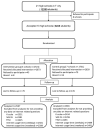A School-Based Program for Problematic Internet Use for Adolescents in Japan
- PMID: 38002845
- PMCID: PMC10670389
- DOI: 10.3390/children10111754
A School-Based Program for Problematic Internet Use for Adolescents in Japan
Abstract
Despite the serious influence of problematic Internet use on mental health among Japanese adolescents, no randomized clinical trials have investigated universal school-based interventions for this potential health challenge. Therefore, this study aimed to assess the efficacy of a school-based educational program. This two-armed, parallel, cluster-based randomized clinical trial included 5312 students from 13 high schools situated in a mid-sized Japanese city. The students in the intervention arm received 10 weekly standardized sessions, including a combination of information provision and interactive sessions by schoolteachers. The students in the control group followed a standard school curriculum. A generalized estimating equation model was applied to assess the primary (Korean Scale for Internet Addiction [K-scale] score) and secondary (behavioral change status according to changes in the transtheoretical model smartphone addiction score and Internet usage time) outcomes two months after intervention completion. The intention-to-treat analysis included 2597 (97.2%) and 2504 (94.9%) students in the intervention and control groups, respectively. Nevertheless, a significant discrepancy emerged regarding the behavioral change status. Therefore, this school-based program did not improve the Internet or smartphone addiction scores among Japanese adolescents. Further studies are needed to develop appropriate interventions for adolescents.
Keywords: Internet addiction; adolescence; educational measurement; population approach; transtheoretical model.
Conflict of interest statement
The authors declare no conflict of interest. The funders had no role in the design of the study; in the collection, analyses, or interpretation of data; in the writing of the manuscript; or in the decision to publish the results.
Figures
Similar articles
-
Recovery schools for improving behavioral and academic outcomes among students in recovery from substance use disorders: a systematic review.Campbell Syst Rev. 2018 Oct 4;14(1):1-86. doi: 10.4073/csr.2018.9. eCollection 2018. Campbell Syst Rev. 2018. PMID: 37131375 Free PMC article.
-
Cross-cultural adaptation and psychometric properties of the Korean Scale for Internet Addiction (K-Scale) in Japanese high school students.Psychiatry Res. 2017 Mar;249:343-348. doi: 10.1016/j.psychres.2017.01.044. Epub 2017 Jan 19. Psychiatry Res. 2017. PMID: 28152469
-
Effects of a group mindfulness-based cognitive programme on smartphone addictive symptoms and resilience among adolescents: study protocol of a cluster-randomized controlled trial.BMC Nurs. 2021 Jun 5;20(1):86. doi: 10.1186/s12912-021-00611-5. BMC Nurs. 2021. PMID: 34090443 Free PMC article.
-
Effectiveness of a mobile app-based educational intervention to treat internet gaming disorder among Iranian adolescents: study protocol for a randomized controlled trial.Trials. 2022 Mar 21;23(1):229. doi: 10.1186/s13063-022-06131-0. Trials. 2022. PMID: 35313935 Free PMC article.
-
Treatment Modalities for Internet Addiction in Children and Adolescents: A Systematic Review of Randomized Controlled Trials (RCTs).J Clin Med. 2023 May 8;12(9):3345. doi: 10.3390/jcm12093345. J Clin Med. 2023. PMID: 37176784 Free PMC article. Review.
Cited by
-
The Transition from Childhood to Adolescence: Between Health and Vulnerability.Children (Basel). 2024 Aug 14;11(8):989. doi: 10.3390/children11080989. Children (Basel). 2024. PMID: 39201923 Free PMC article. Review.
-
Navigating the digital frontier: protecting adolescents in the age of mobile internet.Pediatr Res. 2025 Jan 13. doi: 10.1038/s41390-025-03835-2. Online ahead of print. Pediatr Res. 2025. PMID: 39806056 No abstract available.
References
-
- Fineberg N.A., Demetrovics Z., Stein D.J., Ioannidis K., Potenza M.N., Grünblatt E., Brand M., Billieux J., Carmi L., King D.L., et al. Manifesto for a European research network into problematic usage of the Internet. Eur. Neuropsychopharmacol. 2018;28:1232–1246. doi: 10.1016/j.euroneuro.2018.08.004. - DOI - PMC - PubMed
-
- Sohn S.Y., Rees P., Wildridge B., Kalk N.J., Carter B. Prevalence of problematic smartphone usage and associated mental health outcomes amongst children and young people: A systematic review, meta-analysis and GRADE of the evidence. BMC Psychiatry. 2019;19:356. doi: 10.1186/s12888-019-2350-x. - DOI - PMC - PubMed
Grants and funding
LinkOut - more resources
Full Text Sources


